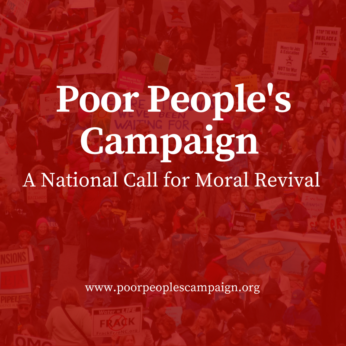
Rev. William Barber is fighting the good fight, and every day that he fights it, he wins. As part of his ongoing push for a Moral Revival, Rev. Barber’s next struggle is a national Poor People’s Campaign to fight poverty, racism, militarism, and all of the results of unequal distribution of wealth.
It sounds daunting, and has been tried before with, at best, mixed results. President Lyndon Johnson’s early 1960’s War on Poverty numbered some hard-fought victories, but even more bitter setbacks. Martin Luther King, Jr. set out on the 1968 Poor People’s Campaign to march on Washington, D.C., to demand economic justice and human rights. After King’s assassination, the Campaign foundered.
But don’t bet against Barber. His track record is quite impressive. As president of North Carolina’s NAACP, Rev. Barber built a coalition of 93 concerned organizations, committed to social change, that engaged in regular “Moral Mondays” protests at the North Carolina state capitol. This prominent, very vocal coalition succeeded in pressuring state legislative action and upending Republican Gov. Pat McCrory. This opposition pushed out the first sitting governor of North Carolina to lose a re-election campaign since 1850.
Among his other accomplishments, Rev. Barber counts honorary degrees from Drew University and Occidental College, three books, the founding of social-religious-educational non-profit powerhouse, Repairers of the Breach, speakership at the Democratic National Convention, and a series of arrests culminating in those protesting for health care legislation.
“The U.S. is in a moral crisis. We need to challenge private morality,” the Reverend said in an interview with this reporter last week.
“There is a deep moral underpinning of progressive ideas. We must deal with systemic racism, the war economy, health care, and redistribution of wealth. We are now engaged in the greatest transference of wealth since the days of slavery.”
Speaking on the inequality that pervades the current era, he said, “We take money and give to the greedy while letting other people die of need…like in the post-Civil War era, when the Freedman’s Bureau Hospitals health care was given, then taken away.”
“Today,” he said, “there are familiar arguments to justify the new take-aways, arguments that people do not deserve health care.”
But it doesn’t have to be this way, and collective action has the potential to turn things around.
“We are involved in a movement for change. We need to help communities understand how they are engaged and how to use all their tools—for instance, non-violent civil disobedience—to effect social change. We must look at what emboldens racism, anti-immigrant hatred, and anti-worker actions. Dr. King was right: if you don’t deal with the evils, you will always have the problems.”
To fight those evils, Rev. Barber has enlisted powerful allies to back the Poor People’s Campaign. Rev. Dr. Liz Theoharis is the Campaign’s co-director. She is also co-director of the Kairos Center for Religions, Rights, and Social Justice and founder of the Poverty Initiative.
Together, Barber and Theoharis head a prominent, diverse national steering committee led by those experienced with and directly impacted by the scourge of economic inequality.
To effect this Moral Revival, they demand a return to America’s moral roots—whether actual or idealized. Religious leaders from Billy Graham to Joel Osteen have cited America’s moral exceptionalism. But as Theoharis and Barber point out, this ethos must grow out of the socio-economic gospel.
Here in the richest nation in the world, the great transfers of wealth Rev. Barber cites have left the poor and working class further and further behind. The gap between rich (or even comfortable) and poor has widened dramatically in the last two decades.
Over 43 million Americans live in poverty. Homelessness appears intransigent and increasing. Poverty among youth and seniors, particularly, keeps rising. The number of homeless students has doubled to 1.36 million, an 8 percent increase since before the last recession. Twenty-two percent of all U.S. children live in families below the federal poverty level. Forty percent of American kids spend at least one year in poverty before they reach the age of eighteen. Poverty among seniors has been increasing at a rate of over 350,000 a year.
The Poor People’s Campaign proposes a multi-faceted effort, growing out of the dire straits of the poor and led in large part by the poor themselves. The Campaign started this past year with a tour of 25 states, including in the cities of Louisville, Detroit, Milwaukee, Topeka, Charlotte, Los Angeles, and Albuquerque. Experiences were shared. Non-violent civil disobedience training was given. Planning sessions were conducted.
Next year, the Poor People’s Campaign plans to conduct Forty Days of Action with at least 1,000 participants in each of 25 states. The campaign will unite, organize, hold witness, and conduct direct action including education, concerts, displays, teach-ins, and other activities aimed at social change.
The Poor People’s Campaign aims to build with, not just for, poor people. Its efforts are targeted to state capitals and localities, as well as Washington, D.C. If you are interested in getting involved, no matter where you are, no matter what your skills (including just enthusiasm), please contact info@breachrepairs.org or newpoorpeoplescampaign@gmail.com.
Michael Berkowitz was a volunteer and teacher with the original 1968 Poor People’s Campaign in Washington, D.C.










